Social-Emotional Needs and Support
Self-Management & Executive Function
To remind ourselves, self-management is the ability to regulate one’s emotions, thoughts, and behaviors effectively in different situations. This includes managing stress, controlling impulses, motivating oneself, and setting and working toward goals (Credit: CASEL).
One glance at the list of behavioral traits that are developed in this competency will help you see how a gifted students with ADHD or autism will need more than universal support to develop self-management skills!
Executive Function (EF) Skills
Often, when we think of problems with executive functioning, we think of disorganization; however, organization is only one of these important skills.
Here is a list of abilities covered under the umbrella term of executive functioning:
Emotional Control: The ability to manage emotions in order to achieve goals, complete tasks, or control and direct behavior. A young child with this skill is able to recover from a disappointment in a short time. A teenager is able to manage the anxiety of a game or test and still perform.
Flexibility: The ability to revise plans in the face of obstacles, setbacks, new information or mistakes. It relates to an adaptability to changing conditions. A young child can adjust to a change in plans without major distress. A high school student can accept an alternative such as a different job when the first choice is not available.
Goal-directed persistence: The capacity to have a goal, follow through to the completion of the goal, and not be put off by or distracted by competing interests. A first grader can complete a job in order to get to recess. A teenager can earn and save money over time to buy something of importance.
Metacognition: The ability to stand back and take a birds-eye view of oneself in a situation. It is an ability to observe how you problem solve. It also includes self-monitoring and self-evaluative skills (e.g., asking yourself, “How am I doing? or How did I do?”). A young child can change behavior is response to feedback from an adult. A teenager can monitor and critique her performance and improve it by observing others who are more skilled.
Organization: The ability to create and maintain systems to keep track of information or materials. A young child can, with a reminder, put toys in a designated place. An adolescent can organize and locate sports equipment.
Planning/Prioritization: The ability to create a roadmap to reach a goal or to complete a task. It also involves being able to make decisions about what’s important to focus on and what’s not important. A young child, with coaching, can think of options to settle a peer conflict. A teenager can formulate a plan to get a job.
Response Inhibition: The capacity to think before you act – this ability to resist the urge to say or do something allows us the time to evaluate a situation and how our behavior might impact it. In the young child, waiting for a short period without being disruptive is an example of response inhibition while in the adolescent it would be demonstrated by accepting a referee’s call without an argument.
Stress Tolerance: The ability to thrive in stressful situations and to cope with uncertainty, change, and performance demands. We generally reserve our discussion of this skill to adults, since it seems more relevant with this population. We find it helps people understand the kind of work environment they do best in.
Sustained Attention: The capacity to maintain attention to a situation or task in spite of distractibility, fatigue, or boredom. Completing a 5-minute chore with occasional supervision is an example of sustained attention in the younger child. The teenager is able to attend to homework, with short breaks, for one to two hours.
Task Initiation: The ability to begin projects without undue procrastination, in an efficient or timely fashion. A young child is able to start a chore or assignment right after instructions are given. A high school student does not wait until the last minute to begin a project.
Time Management: The capacity to estimate how much time one has, how to allocate it, and how to stay within time limits and deadlines. It also involves a sense that time is important. A young child can complete a short job within a time limit set by an adult. A high school student can establish a schedule to meet task deadlines.
Working Memory: The ability to hold information in memory while performing complex tasks. It incorporates the ability to draw on past learning or experience to apply to the situation at hand or to project into the future. A young child, for example can hold in mind and follow 1-2 step directions while the middle school child can remember the expectations of multiple teachers.
Credit: Adapted by Krista Klabo (CDE School Psychology and Special Education Evaluation Specialist) from Smart But Scattered: The Revolutionary ‘‘Executive Skills’’ Approach to Helping Kids Reach Their Potential, by P. Dawson and R. Guare. Guilford Press.
The National Association for Gifted Children has provided information about Gifted Learners and Executive Function including: factors that may impede a gifted child’s executive functioning, signs that kids are struggling with executive function skills, and strategies to support high-ability learners with executive functioning deficits. Take a few minutes to open and skim the article.CDE does not endorse any person or program. We are sharing some resources that have been shared with us that educators have found useful. Check with your district resources to see if trainings are available. For some free professional development resources for educators and parents, you may (optionally) check out Unstuck and On Target. They have created 12, 3-5 minute videos for parents
about how to support elementary school age children with executive function
problems, including staying calm when faced with a challenge. A PDF with the video links is in our shared folder HERE. A Spanish version is also in the folder HERE. Built
on evidence-based techniques from the Unstuck and on Target! curriculum, the videos
can also be used to support parents,
but also paraprofessionals,
new professionals, or any
staff who will benefit from a basic introduction to executive function. They also provide free Unstuck training
for faculty and staff throughout the state of Colorado who are interested in
running an Unstuck group.
Some of us on the 2e Project have also found Sarah Ward's work useful for all students. She works with educators to teach specific strategies to increase executive function skills. She has online trainings that go into specific details on the steps involved. For more information, you can check out her Cognitive Connections website, or if you like to get inspired by Pinterest, you can explore the different resources that pop up at the bottom of her page.
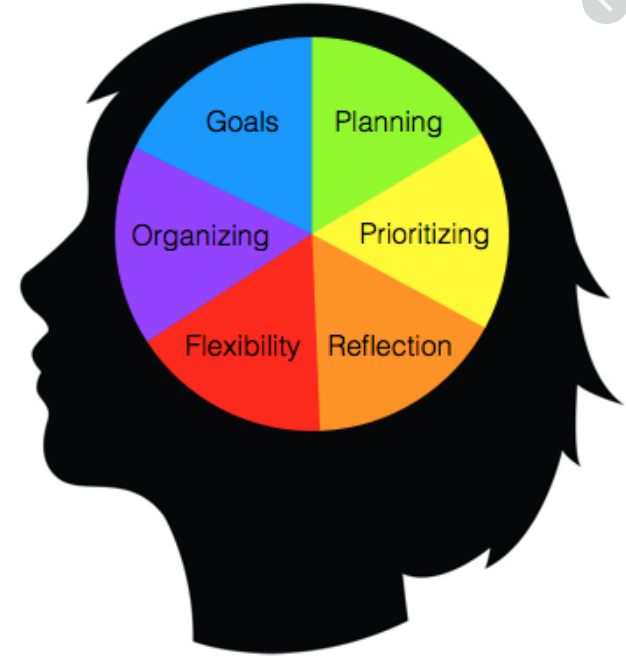
While developing EF skills is crucially important for most 2e learners, it will take time on your part to go into depth to learn and apply the strategies that teach students these skills.
In Brief: To strengthen executive function skills--always start by helping students develop non-verbal working memory.
According to Ward, some strategies to teach students are:
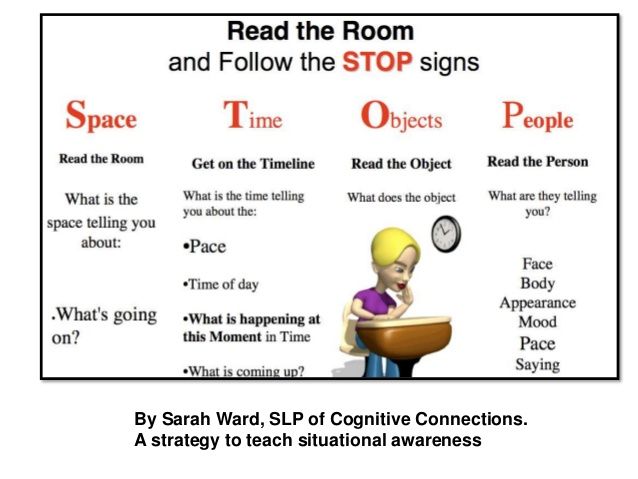
2. Get Ready, Do, Done - Planning Strategy
It is important to start with DONE before GET READY or DO.
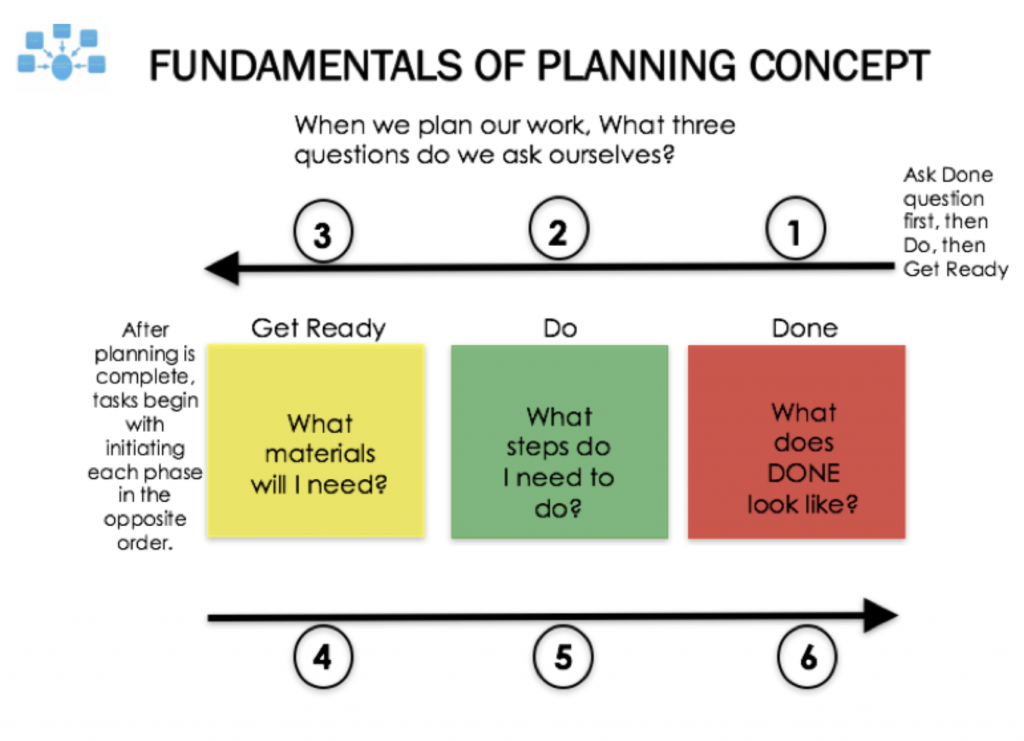
For a 4:03 minute video from one school using Get Ready-Do-Done, see this OPTIONAL video.
3. Time Sweep strategy (Important for students with weak EF to see the passage of time using strategies involving analog clocks.)
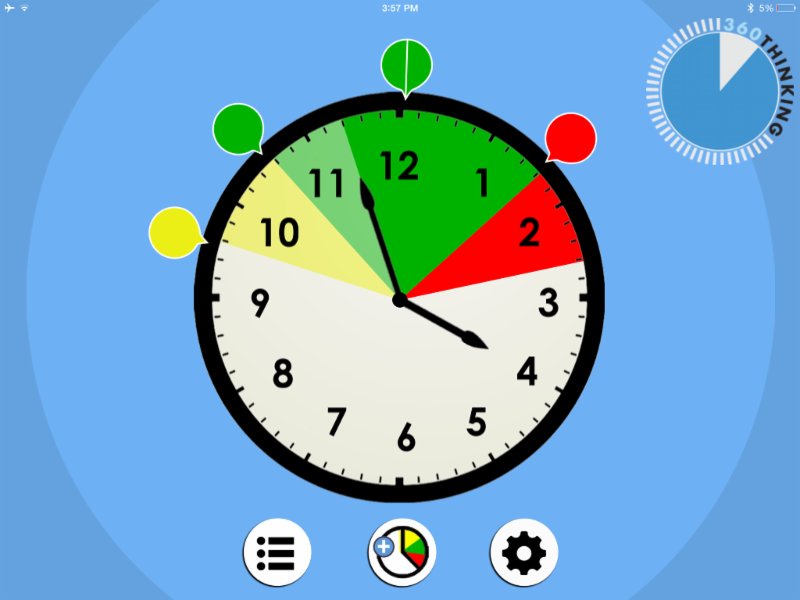
(Sarah Ward-Cognitive Connections)
4. Planners
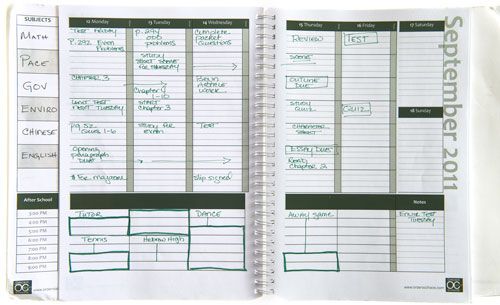
(Out of the Chaos)
5. Use color with purpose to organize lists & planners.

This is a super brief "balcony view" of the extensive guidance offered by Sarah Ward. If it looks useful, please go deeper into her resources, or check out the many videos on YouTube by her and others (optional).
Optional:
In the Davidson Institute Article -- Tips for Parents: Executive Functioning at Home and School the author points out that, "Weaknesses in EF tend to affect all areas of gifted kids’ lives, including some of what might seem like basic self-care or home life tasks, and can be extremely frustrating for parents and siblings. The article also provides a list compiled from several different sources of executive functions which may be helpful to skim and save for use later
Krista Klabo, CDE's school psychology and special education evaluation specialist has a wealth of resources, including videos of previous presentations on executive functioning. To view these resources, go HERE.
Curriculum Resources (from Krista Klabo's presentation on Strategies and Best Practice: Executive Functioning Assessment, Dec 14, 2021
The Alert Program: How Does Your Engine Run?
BrainWise: 10 Wise Ways to Stop and Think
The Incredible 5-Point Scale
The Incredible Years
In Focus: Improving Social and Emotional Intelligence One Day at a Time
Kindness in the Classroom: Random Acts of Kindness Foundation
MindUp
RULER-Yale Center for Emotional Intelligence
EF in the Classroom
Sarah Ward strategies such as STOP and Read the Room, Job Talk, Working Clock and Get Ready, Do Done.
SecondStep: Skills for Social and Academic Success
Stop & Think Social Skills Program (Project ACHIEVE)
Superflex: A Superhero Social Thinking Curriculum
You are a Social
Detective-Explaining Social Thinking to Kids
The WhyTry Program
Zones of Regulation: A Framework to Foster Self-Regulation & Emotional Control
Kidspiration
Training Opportunities for Teachers and Schools through Unstuck. See PDF and website.